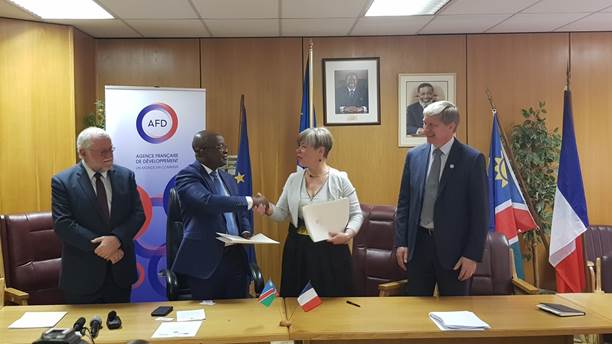
French grant agreement to boost emergence of Public-Private Partnerships

By Natasha Jacha
The Minister of Economic Planning of Namibia, Hon Obeth Kandjoze, Friday met with the Southern Africa Regional Director of Agence Française de Développement (AFD), Bruno Deprince and H.E. Claire Bodonyi, French Ambassador to Namibia, to sign a Euro 400,000 grant.
The grant is meant to promote the emergence of Public-Private Partnerships (PPPs) in the country which aim at creating growth and job opportunities that will lift the income and quality of life for its citizens
“Today’s agreement is another step in the cooperation between our two countries. It is the first financing agreement between the Republic of Namibia and the French Development Agency, since its establishment in Namibia in 1998, and we hope it will be followed by other ones in the near future. It perfectly illustrates our government’s new vision for solidarity investments,” said Bodonyi.
“AFD is looking forward to develop its activities to contribute to the country’s development priorities. In the near future, we will bring a full time AFD presence in Windhoek and this will allow us to strengthen our relationship with local institutions and pursue our discussions with our counterparts to support Namibia’s economic transformation,” said Deprince.
AFD’s three-year grant will be used to identify potential PPP projects to be developed in priority; to build the capacity of public and private sector professionals in charge of implementing PPP projects; to conduct pre-feasibility studies for PPP projects; and to develop a PPP toolkit dedicated to public and private entities in charge of structuring PPP projects.
Caption: Finance Ministry Calle Schlettwein, Minister of Economic Planning Obeth Kandjoze, H.E. French Ambassador to Namibia Claire Bodonyi and Bruno Deprince at the signing agreement.











































